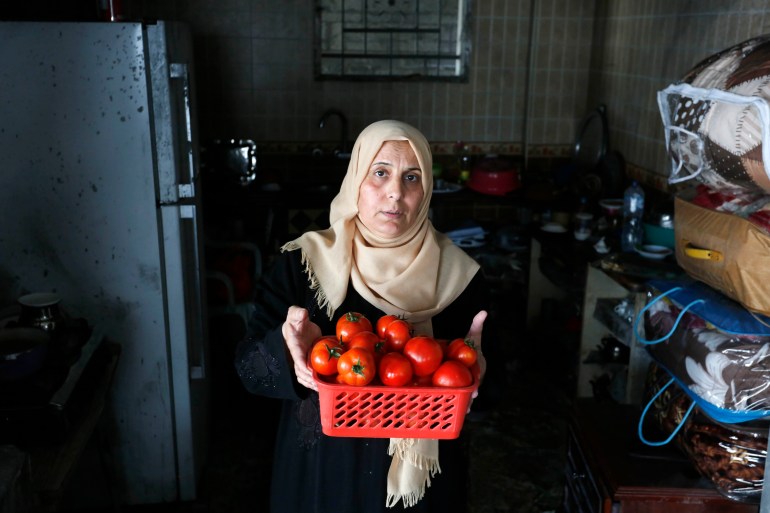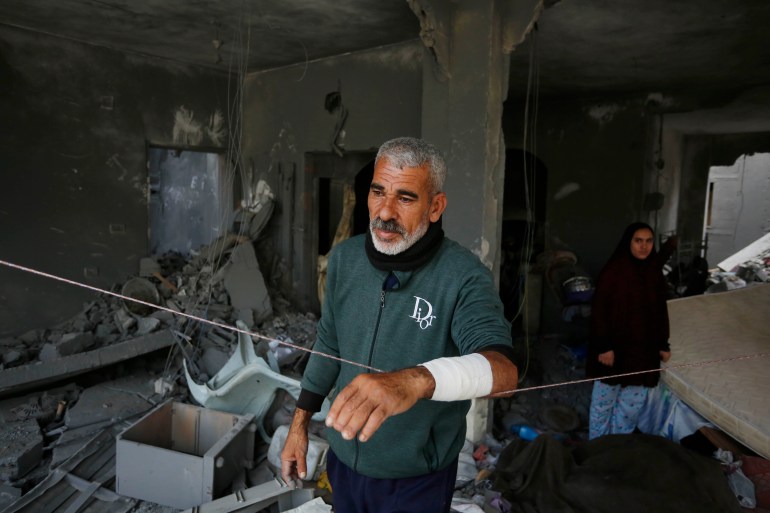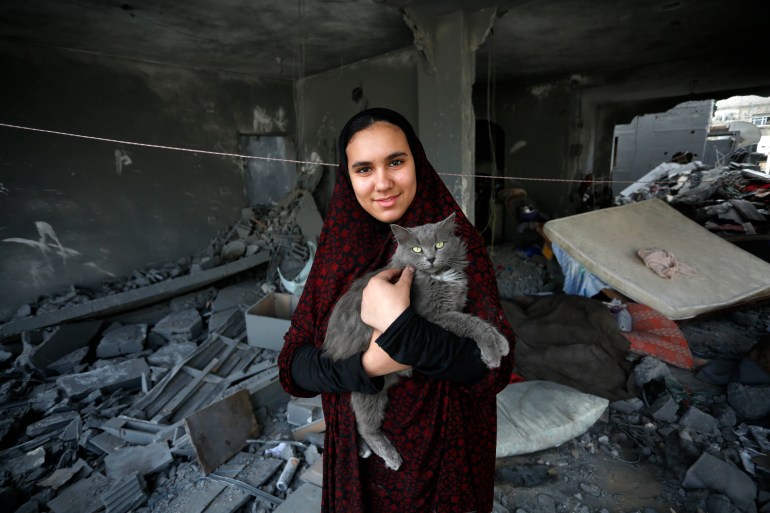[ad_1]
Deir al-Balah – On the third day of Israel’s offensive on the Gaza Strip, Siham Naji was sitting opposite her husband Khaled in their living room when she remembered to take her daily medication.
She walked to the kitchen and opened the door to the refrigerator to get some water. The next second she found herself in hell.
“I was knocked to the floor and felt something hot over me,” the 48-year-old said. The air around her had darkened and filled with dust, the sounds of destruction ringing in her ears.
An Israeli missile hit her neighbour’s house, flattening it completely and damaging the Naji home.
Siham screamed out her husband’s name repeatedly before she heard his faint laboured breathing.
Crawling on her hands and knees, she made it back to the living room and saw the lower half of Khaled’s body buried under the rubble. Blood trickled out of his mouth.
Her son Mustafa lay in shock in his bedroom, thinking he had lost all feeling in his body.
Eventually, mother and son managed to free Khaled from the rubble and the three staggered out of their ruined home, hurt but alive.

‘My own palace’
The Naji family home, where 15 members were staying, had been a labour of love – Khaled built it himself over the years. It boasted two living rooms, three bedrooms, a kitchen, a large bathroom and a partially-finished apartment for his married son on the second floor.
“It was like living in my own palace,” Khaled, 51, said. “All my life and dreams were in this house.”
“I was in the process of building a balcony overlooking the garden,” he added. “I had plans to make a small swimming pool for the younger children in the summer.”
A day after the attack, Khaled returned to survey the damage to his beloved house.
“All those years of working were poured into the effort of building this house with my own hands, with the help of my wife,” he said. “I mixed the concrete and designed the layout and picked the best furniture.”

The family had received word that a house in their neighbourhood would be targeted but did not know which one.
For about 10 days, the family tried sheltering at a school but found the conditions unbearable. “There’s no water, electricity, or privacy,” Siham said. “It’s very crowded. So we went to Al-Aqsa Martyrs Hospital but the situation there was more or less the same.”
The Naji family decided to return to their home and live among the ruins, seeing it as a better option. After removing rubble from one room and cleaning it as best as they could, they laid mattresses down for sleeping. The room had no doors or windows.
“Where else would we go, on the streets under a tarp?” Khaled asked rhetorically. “So that if my children don’t die in an Israeli attack, they’ll die from freezing to death or from any of the diseases that have broken out? I’d rather die in my home with dignity than live in a tent.”

Hope for rebuilding
According to the Ministry of Public Works and Housing in Gaza, Israeli bombing has damaged more than half of all residential units – more than 222,000 homes – in the Gaza Strip. At least 40,000 homes have been completely destroyed but the ministry has not been able to update these statistics since November 6 when it collapsed.
The now-ruined Naji home is littered with debris. Metal pipes poke out of broken concrete and there are gaping holes where walls once stood. The kitchen has remained mostly intact. Through a small corridor, past the damaged washing machine, is the room where the family sleeps.
Layan Naji, 15, hangs up the hand-washed laundry on ropes tied over the ruins.
“The room we sleep in gets very cold,” she said. But she is grateful her seven-year-old cat, Sondos, survived the Israeli air raid.
“I thought I lost Sondos and was so happy when my father found her,” she said. “She always sleeps by my feet.”

Because all of their bedding was lost, her mother had to borrow a blanket and pillow from a neighbour.
“My daughters hang out in the room but I find myself needing space so I sit alone, with my hand on my cheek,” Siham said. She thinks mostly of their ruined garden, which had guava, fig, lemon and date palm trees.
“I loved our garden,” she said. “We would sit there and enjoy drinking tea, and talk. I hope we will be able to rebuild our house and make it even better than before.”
[ad_2]
Source link
